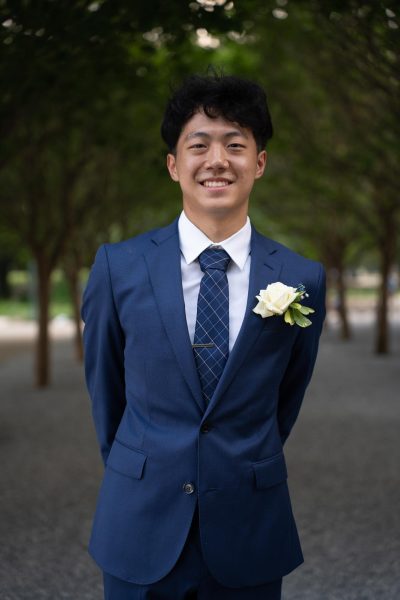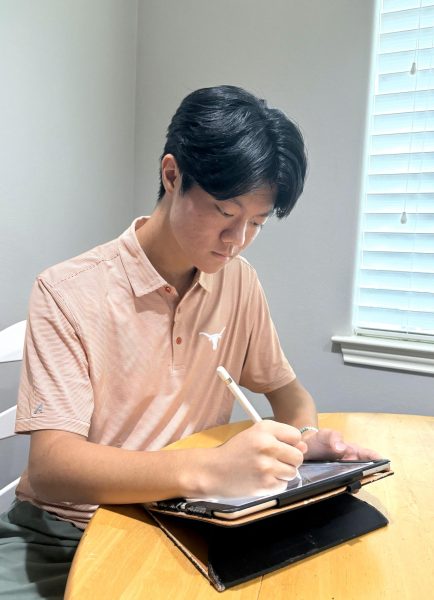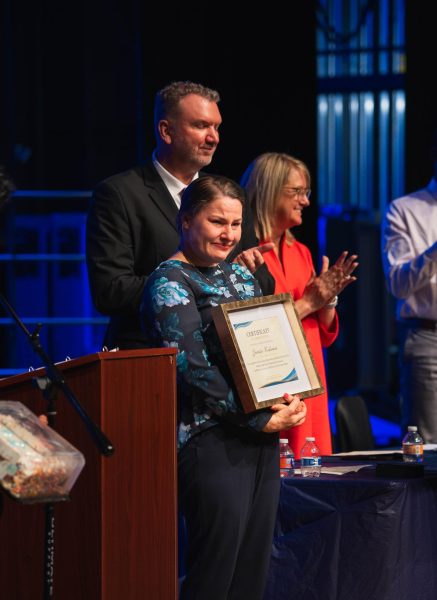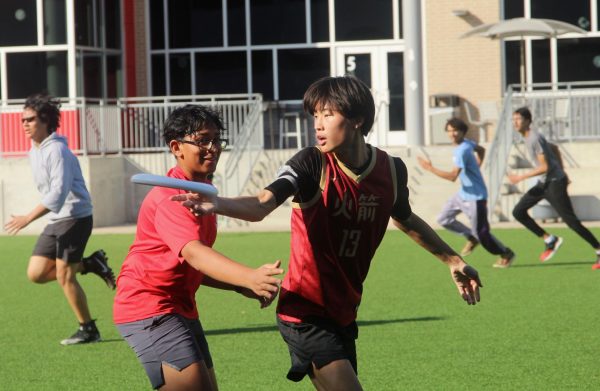‘It’s a big step’
Algebra teacher becomes US citizen
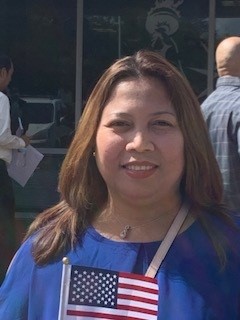
Photo provided by Merceflor Kirk
Algebra 2 teacher Merceflor Kirk smiles for a picture outside the US Citizenship and Immigration Services Office while holding a miniature American flag in her hand. After getting her citizenship, Kirk told her family and friends about the great news.
After 18 years in the U.S., she would finally get her citizenship. Up to the moment of being sworn in, her hope of heading to a new future mixed with the uneasiness of leaving her past.
Algebra 2 teacher Merceflor Kirk moved from the Philippines to Houston in 2003 and eventually got her U.S. citizenship in October last year. She started teaching at Sam Houston High School and eventually Bellaire, where her journey to citizenship has come to a close.
“I was born in the Philippines,” Kirk said. “I grew up there. I got my bachelor’s degree and started my master’s there up until I moved to Houston in 2003. When I moved to Houston, I was given a chance to teach here after already teaching in the Philippines for 4-5 years.”
Although teaching in the Philippines was fulfilling, Kirk said that “her idealism there kind of faded.” For a year, her uncle tried to convince her to come over to the U.S., but she remained adamant about staying in the Philippines until her teaching situation took a turn.
“My uncle offered one of my cousins the opportunity to come to the U.S., too,” Kirk said. “I told him ‘just give it to her. I’m okay here.’ But that changed when I came back from a national conference, and suddenly, I was no longer the math department chair at my school.”
“I was disappointed, heartbroken. I told myself ‘I’ve served the youth of my country for long enough, and that it was time for me to move somewhere else.’ So, I told my uncle ‘hey, I’m willing to go to the U.S. now,’” Kirk said.
At first, Kirk’s plans involved teaching in the U.S. for a while, and then returning to the Philippines.
“It was just supposed to be a trial: am I gonna go or stay,” Kirk said. “And, I thought ‘I’m just gonna stay here for a little bit, cool off, then go back to the Philippines and teach again there. But, then I had life here, and met Mr. Kirk. So, I decided to stay.”
Kirk first began teaching in the U.S. at Sam Houston High school, located in Arlington Independent School District. While she taught there, the district started processing her paper as a permanent resident.
“When my principal did that for me,” Kirk said, “I thought ‘Okay then, I’m here to become a permanent resident.’ The whole process was long, though. It started when I was in Sam Houston High School, and then when I was teaching at Austin High School, my application still hadn’t been touched.”
After 17 cumulative years under her H1B working visa, and then a permanent resident green card, Kirk applied for U.S. citizenship, finally being sworn in on Oct. 21 last year.
“It was exciting,” Kirk said. “Most people are so excited when they become a U.S. citizen. It’s good to become one since you have those rights and responsibilities, so part of me is excited about it. But, part of me is also like ‘Man, you have to renounce your Filipino citizenship’ to become a U.S. citizen instead.”
Although Kirk did not formally celebrate her US citizenship, she said that she was appreciative of her citizen status and grateful for all the experiences she had while getting her citizenship.
“Getting your citizenship is not an easy process,” Kirk said. “It’s really something worth celebrating. It’s just that I’m not so sentimental about it, but I do appreciate it. I did tell everybody, my family, friends and the teachers who are in my PLC, which is my way of celebrating.”
One of her most memorable parts of her journey to citizenship revolved around the interviewing process from when she first came to the U.S.
“When you first come into the United States, an immigration officer there will interview you and ask you what you will be doing here in the U.S.,” Kirk said. “I told the officer who interviewed me that I’m going to be teaching high school students, and the officer asked me ‘are you sure? Because I think I was so young then, 27 years old, and the immigration officer thought I was a high school student.”
Before an interview in the U.S., Kirk also had to go through an interview in the Philippines to obtain her VISA. Although Kirk expected the interviewer to ask her what she was going to do in the U.S., she explained that she was surprised when they asked her about “trig equations.”
“I thought they were going to ask about my intentions here,” Kirk said. “But, one of the questions that the officer asked me was: ‘What are the trigonometric functions?’ So, then, I had to talk about sine, cosine and all that. I wasn’t expecting it, but I guess that the officers were trying to check if I knew what I was going to do here.”
Despite the long road to citizenship, Kirk now looks forward to her future with her family both in the U.S. and the Philippines.
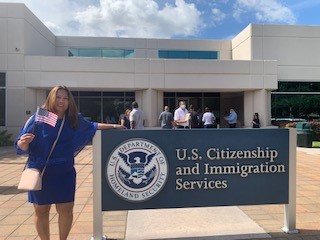
“It’s a big step, and it’s exciting because you don’t have to worry about what’s gonna happen tomorrow,” Kirk said. “I didn’t really mind waiting for a long time. My goal was just to make sure that I have proper papers while staying here. That’s all. I just want to make sure that I don’t go from a legal resident to an illegal alien staying in the United States. I just don’t want that to happen.”
Looking back on getting her US citizenship, Kirk misses teaching in the Philippines, but for now, prioritizes her family.
“I want Tony, my son, to have connections with my family in the Philippines,” Kirk said. “He has visited there several times already, and my parents visit the U.S. sometimes. I still want that connection with them, and I want my son to have those same connections.”
Along with returning to visit with family every two or three years, Kirk also hopes to eventually return to the Philippines to teach and help her fellow teachers.
“I’m going to continue teaching here, but it’s my dream to go back and help out if I can,” Kirk said. “I want to share the strategies and the experience I’ve gained here with the other teachers. That’s one of my goals, but right now, with my son and my family here, they’re my priorities now.”
With a new life here as a U.S. citizen, Kirk said she feels “blessed and grateful” for all the help she received from her family from the start and end of her journey.
“I had my uncle, my family,” Kirk said. “They are the ones who actually asked me to come over. And so they helped me with everything. I didn’t have to sell anything in the Philippines. I didn’t have to borrow money. I could come over just to start a good life here, and it’s one of the things that I’m very grateful for.”
Your donation will support the student journalists of Bellaire High School. Your contribution will allow us to purchase equipment and cover our annual website hosting costs.


